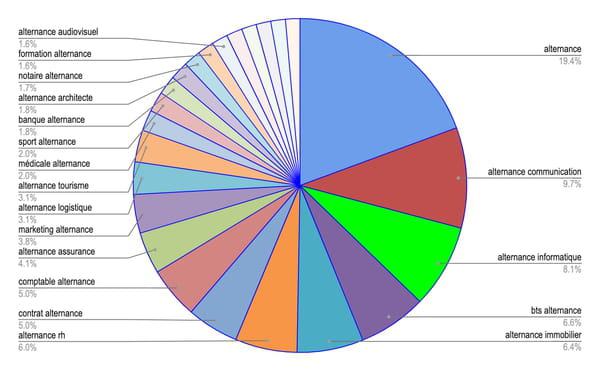Work-study programs have become a very attractive option for many students looking to combine studies and professional experience. However, finding a work-study program can sometimes be a challenge. So let’s take the time to understand what work-study programs are.
Alternation is a training system that combines a practical phase in a company and a theoretical phase in a school. This training method allows students to acquire professional experience while continuing their studies. Alternation has proven its effectiveness by increasing learners’ chances of landing a job in their chosen field.
In 2024, work-study programs continue to gain popularity, supported by government policies that encourage this form of apprenticeship. The government is maintaining support for the recruitment of work-study students, aiming to reach one million apprentices per year. This support allows many young people to access quality training while working, and helps companies train and recruit talent.
This is not surprising, as work-study training has a number of important advantages for both students and companies. For students, it allows them to gain practical professional experience while continuing their studies, thus contributing to a deeper understanding of their future profession. In addition, it provides a source of income through remuneration during studies, which reduces the financial burden of studies and limits the accumulation of student debt. For companies, on-the-job training allows them to train staff according to their specific needs, while benefiting from a source of motivated and qualified labor. So if you are a student and are looking for teleworking opportunities, check out the teleworking offers for students available on Jooble.
According to Jooble data, the demand for apprenticeships has increased significantly: in 2024, the supply of positions (the number of positions offered by employers) increased by 7.8% compared to 2023. A peak in positions is expected in late summer and early September, indicating a positive trend and growing recognition of this apprenticeship path.
Here is the list of the most searched keywords in alternation on the platform:

This statistical analysis highlights the growing enthusiasm for work-study opportunities, reflecting a trend observed on the platform.
Preparation
So, what steps should the young job seeker be prepared for? Of course, it depends on the employer’s requirements, but we can distinguish a few essential steps to take before finding the work-study program:
- The first and most important step: prepare your CV and cover letter. Adapt them to each offer, highlighting your skills and motivations. Do not hesitate to check the employer’s requirements and adapt your CV to the company’s needs.
- Search on a job board, a work-study platform, and a job aggregator: Visit specialized sites like Jooble, which offers filters to refine your searches by location, field, and level of experience.
- Create offer alerts and sign up for email notifications so you don’t miss out on your dream offer. Save your search criteria to receive notifications as soon as a new offer matching your criteria is published.
- Network: Let people know that you are looking for an internship. Recommendations can often open doors.
Opportunity
If you don’t have any experience in work-study, it’s not a problem because this type of work is specially created to be a profitable solution for both the work-study applicant and the employer. Be aware that many companies are willing to train new potential workers. For those looking for opportunities without experience, you can check out the student job offers without experience available on platforms like Jooble.
- Highlight your transferable skills: Use examples of academic or volunteer projects to demonstrate your skills.
- Show your motivation: Clearly explain why you are interested in the field and what you hope to learn.
- Take initiative: offer to do observation internships or participate in volunteer projects to gain experience.
Interview
It is important to start by clearly defining what you are looking for in terms of sector of activity, profession and type of company. This will help you target your searches and find work-study offers that match your expectations. To succeed in an interview, start by preparing well by learning about the company and the position, and by preparing answers to common questions as well as questions to ask (you can always search them on Google or Youtube to find examples).
Research
Keep searching for offers, applying and preparing for interviews. With patience and determination, you will eventually find an internship that matches your expectations and ambitions. If you are a student and are looking for a remote job or a job without experience, you can use platforms like Jooble, which offers filters, which will help you adjust your search and select the job offers optimally for you.
Thank you for reading this practical guide on work-study programs, an exciting opportunity to combine studies and professional experience, thus opening up new perspectives. To maximize your chances of success, clearly define your objectives, actively explore specialized platforms and social networks, and mobilize your personal network. Adapt your CV and cover letter to each application, prepare yourself carefully for interviews by finding out about the company and explaining your motivation. Maintain a persevering attitude and continue to apply despite possible refusals. With patience and determination, you will find a rewarding work-study program.
Good luck in your search!
